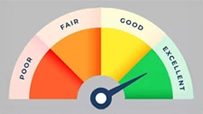Loan Against Property vs Personal Loan: Which One is Right for You?
Disclaimer: Ujjivan Small Finance Bank does not offer personal loans. This blog is written for generic information only.
September 03, 2025

When faced with a financial need—whether it's for business expansion, medical emergencies, or debt consolidation—you may find yourself choosing between a Loan Against Property (LAP) and a Personal Loan. While both provide funds, they have distinct features, eligibility criteria, and advantages. This blog breaks down their key differences to help you make an informed decision.
What is a Loan Against Property (LAP)?
A Loan Against Property or LAP is a secured loan where you pledge your residential, commercial, or industrial property as collateral. The bank provides funds based on the property’s value, and the loan can be used for various purposes, except speculative activities.
Key Features of LAP:
- Loan Amount: Up to 50%-70% of the property’s market value.
- Interest Rate: Lower than personal loans
- Tenure: Longer repayment period (up to 15-20 years).
- Eligibility: Requires property ownership and proof of stable income.
- Processing Time: Longer due to property valuation and verification.
What is a Personal Loan?
A Personal Loan is an unsecured loan that does not require collateral. Banks evaluate your creditworthiness, income, and repayment capacity before approving the loan.
Key Features of Personal Loan:
- Loan Amount: Depends, but could be lower than LAP.
- Interest Rate: Higher than LAP (ranges from 10% to 24% p.a.).
- Tenure: Shorter repayment period (typically 1-5 years).
- Eligibility: Based on income, credit score (preferably 700+), and employment status.
- Processing Time: Faster (approval within a few hours to 2 days).
Key Differences: Loan Against Property vs Personal Loan
| Feature | Loan Against Property (LAP) | Personal Loan |
| Security | Requires property as collateral | No collateral required |
| Interest Rate | 8%-12% p.a. (lower) | 10%-24% p.a. (higher) |
| Loan Amount | Up to 70% of property value | Generally up to ₹50 lakh |
| Repayment Tenure | 10-20 years (longer) | 1-7 years (shorter) |
| Processing Time | Slower due to property verification | Faster (instant to a few days) |
| Eligibility | Based on property ownership and income | Based on income and credit score |
| Usage Flexibility | Can be used for business, education, medical needs, etc. | Unrestricted use |
Which Loan Should You Choose?
1. Opt for Loan Against Property If:
- You need a large loan amount at a lower interest rate.
- You own a property that can be pledged.
- You prefer a longer repayment tenure for manageable EMIs.
- You need funds for business expansion, medical treatment, or education.
2. Opt for Personal Loan If:
- You need quick funds without collateral.
- You have a high credit score and stable income.
- Your requirement is short-term and you can repay within 5 or less years.
- You want minimal paperwork and instant disbursal
Final Thoughts
Both Loan Against Property and Personal Loan serve different financial needs. If you have a valuable property and require a high loan amount with lower EMIs, LAP is a better option. However, if you need quick funds without risking your assets, a Personal Loan is ideal. Assess your financial situation carefully and choose the option that aligns with your repayment capacity and requirements.
Buying a house has never been this easy! Avail Ujjivan SFB’s wide range of affordable home loan products and enjoy a hassle-free loan journey. From house purchase loan to plot loans and home improvement loans, we have it all! Alternatively, you can browse through Ujjivan SFB product suite - our wide range of financial products are designed to make your financial life better.
Disclaimer:
The contents herein are only for informational purposes and generic in nature. The content does not amount to an offer, invitation or solicitation of any kind to buy or sell, and are not intended to create any legal rights or obligations. This information is subject to updation, completion, amendment and verification without notice. The contents herein are also subject to other product-specific terms and conditions, as well as any applicable third-party terms and conditions, for which Ujjivan Small Finance Bank assumes no responsibility or liability.
Nothing contained herein is intended to constitute financial, investment, legal, tax, or any other professional advice or opinion. Please obtain professional advice before making investment or any other decisions. Any investment decisions that may be made by the you shall be at your own sole discretion, independent analysis and evaluation of the risks involved. The use of any information set out in this document is entirely at the user’s own risk. Ujjivan Small Finance Bank Limited makes no representation or warranty, express or implied, as to the accuracy and completeness for any information herein. The Bank disclaims any and all liability for any loss or damage (direct, indirect, consequential, or otherwise) incurred by you due to use of or due to investment, product application decisions made by you on the basis of the contents herein. While the information is prepared in good faith from sources deemed reliable (including public sources), the Bank disclaims any liability with respect to accuracy of information or any error or omission or any loss or damage incurred by anyone in reliance on the contents herein, in any manner whatsoever.
To know more about Ujjivan Small Finance Bank Products Visit:"https://www.ujjivansfb.in"
All intellectual property rights, including copyrights, trademarks, and other proprietary rights, pertaining to the content and materials displayed herein, belong
to Ujjivan Small Finance Bank Limited or its licensors. Unauthorised use or misuse of any intellectual property, or other content displayed herein is strictly prohibited and the same is not intended for distribution to, or use by, any person in any jurisdiction where such distribution or use would (by reason of that person’s nationality, residence or otherwise) be contrary to law or registration or would subject Ujjivan Small Finance Bank Limited or its affiliates to any licensing or registration requirements.
FAQs
1. Which loan has a lower interest rate: Loan Against Property or Personal Loan?
A Loan Against Property has a lower interest rate (8%-12%) compared to a Personal Loan (10%-24%).
2. Can I apply for a Loan Against Property with a low credit score?
Yes, since LAP is a secured loan, banks may approve it even with a lower credit score, but terms may vary.
3. How long does it take to get a Loan Against Property?
It usually takes 7-15 days due to property evaluation and legal checks.
4. What happens if I default on a Loan Against Property?
The bank may seize and auction your property to recover the dues.
5. Can I get a Personal Loan if I already have an ongoing Loan Against Property?
Yes, if your income supports multiple loan EMIs and your credit score is good.
6. Which loan is better for a medical emergency?
A Personal Loan is better as it is processed quickly, whereas LAP takes longer.
7. Is there a tax benefit on Loan Against Property?
Yes, if the loan is used for business purposes, the interest paid can be claimed as a business expense.
8. Can I use a Loan Against Property for any purpose?
Yes, except for speculative activities like stock market investments.
9. What is the maximum tenure for a Personal Loan?
Typically, it ranges from 1 to 7 years, depending on the bank.
10. Does a Loan Against Property affect my credit score?
Yes, timely repayment improves your score, while defaults negatively impact it.
Latest Blogs

APK Fraud: How One Wrong Download Could Empty Your Bank Account
May 13, 2025
Picture this. You’re sipping your evening tea when your phone rings.

Gold Loan LTV Ratio Explained (75% to 85%): What It Means for Borrowers
March 20, 2025
In June 2025, the Reserve Bank of India (RBI) introduced a significant relaxation for gold loan borrowers: the maximum Loan-to-Value (LTV) ratio for loans below ₹2.5 lakh was raised to 85%, up from the long-standing cap of 75%. Loans between ₹2.5 lakh and ₹5 lakh can now go up to 80%, while loans above ₹5 lakh continue under the 75% ceiling.

Good Debt vs Bad Debt: Learn the Difference
August 13, 2025
Every month, millions of Indians wait for the familiar debit alert, an EMI deducted from their account.

Got a Tax Refund? 5 Smart Ways to Put Your 2025 Refund to Work
August 13, 2025
For many taxpayers, there’s a unique sense of relief when a tax refund arrives.

Credit Score Not Improving? 5 Mistakes You Might Be Making
August 13, 2025
For most of us, a credit score feels like a silent judge sitting in the background of our financial lives.




